If our church is growing and successful, is that God’s blessing upon us. If the Jehovah’s witnesses down the road are growing and successful (as they are in Argentina), is that God’s blessing upon them? If our church is struggling, is that a Satanic attack, or God teaching us perseverance, or just that we’re doing it wrong?
The other day I was supposed to go to a meeting, but I didn’t get to the meeting because my bike broke on the way. It took almost exactly the length of the meeting to fix it because everything went wrong, until the moment when it was definitely too late to go to the meeting, when it all fell into place. Was it that God didn’t want me to go to that meeting? Or that Satan didn’t want me to get there? Or because bike parts are of low quality in Argentina, and therefore I should not have left home without enough money for a taxi? (Was that God teaching me that sensible people make a plan B, or was that Satan blinding me to the need to make a plan B, or do I just need to have my brain a bit more plugged in for next time the inevitable happens?)
Today I had things I was planning on doing, but then it really rained and the whole place was under water. Was that because my plan was the wrong plan and God didn’t want it to happen. Or because my timing was out, so God was postponing it to his time? Or because it was the right plan, and therefore Satan didn’t want it to happen? Or because it always rains in Cordoba at this time of year?
What does God really think about what happens? What is the relationship between the physical and the spiritual? Is everything ordained, or does stuff just happen? Tricky isn’t it.
When Martin survived his road accident a lot of people said “God is good”. When he came through his surgery without lasting disability, a lot of people said “God is good”. If he hadn’t survived, or had become permanently disabled, would God still be good? What about other people whose lives haven’t been spared, is God still good. Today 24,000 people will die of hunger-related causes. Yesterday 24,000 people died of hunger related causes, and tomorrow another 24,000 people will die of hunger related causes. Is God still good? Twenty years ago 50,000 people died every day of hunger related causes. Does that mean God is twice as good today as he was twenty years ago?
Now, right here I want to say loud and clear that I firmly and fundamentally believe that God is good. What I am taking issue with is taking “things going well from a human perspective” to evidence that “God is good”.
When chaos strikes we fear that God might not be good after all, and therefore we have to find the tiniest shred of evidence to ease our troubled minds. A couple of months ago, a friend came up with a heartwarming little story about some kid who rescued his family in New Orleans as evidence that God was good even in that disaster. Well yes. But lets not lose sight of the fact that 1,800 people died, quarter of a million people were made homeless, many of whom are still displaced, and $81 billion dollars worth of damage is still being repaired. While the little story is nice, if that’s the best evidence we can come up with for God being good, then we might be forgiven for thinking that he is also very small by comparison to the event.
If God is good, then it would make sense that he is also consistent. And therefore the Bible might be a useful starting point. The Pentateuch’s kind of handy and straightforward here, it shows us how God related to his people, and shaped their history. When the Israelites in the desert did as they were told, God defended them, and when they disobeyed, God punished them. As the religious and social life of the community develops, teachings are given which incorporate rewards for obeying, and punishments for disobeying. As they stand by the Jordan, Moses in Deuteronomy is clear that in the promised land, obedience equals being blessed, and disobedience equals being cursed e.g chapter 11, chapter 28. Which makes it nice and easy to preach. You want stuff to go OK? Obey God. Stuff going badly for you? Obey God and it will go well.
Which is just fine and dandy, until we get to the likes of Jeremiah who screw that theory up good and proper. There is a pretty direct correlation between Jeremiah doing exactly what God tells him to, and Jeremiah finding himself beaten up more than once, imprisoned, thrown into a cistern. Since God is consistent, what he says in the Pentateuch would still follow by the time that we get to Jeremiah, so where he says “obey me and things will go well for you”, we have to say that “things going well” from God’s perspective might include having your head flushed down the toilet, which probably isn’t that much fun if you’re the one wearing the head. Not exactly what we would understand as a “blessing”.
If God is consistent and good, then we would expect him to behave within his character. So when God tells Hosea to take a prostitute for a wife, then this is also within God’s character of being consistent and good. As a side issue, I would be interested in any church or Bible study group who would accept it as being “of God” for one of its members to have a relationship with a sexually promiscuous non-Christian. In fact I know of at least one person who is currently outside the church because of their reaction to his girlfriend. So we might therefore imagine the treatment that Hosea received from his contemporaries, as well as his humiliation from his wife. The most normal argument is that because Hosea´s marriage is used as a metaphor, God is good since he has the big picture. However, if God is consistent, then he must be as good in his relationship with Hosea as with the rest of Israel, otherwise he would be being inconsistent. So we have to say that when stuff happens that we think of as being bad, then not only might it be due to a direct intervention by God, but it might also fall within God´s definition of “things going well for you”.
So now I´m kind of back where I started. What is the relationship between God’s intervention, and stuff that happens? If things seem to be going well then that might be God’s intervention… or it might not. If things seem to be going badly then that might be God’s intervention… or it might not. I´m reminded of Richard Harvey at All Nations who used to say “Yes, but is that the right question”, and I have a sneaking suspicion that if I am finding myself playing some sort of divine hide and seek, then it might be because the question itself needs some work. I´m also reminded of a quote from Nancy Eisland in “The disabled God” (1994) who says:
“An ordinary life is filled with blessings and curses and it is sometimes hard to differentiate between the two.”
And I´m also reminded of a Martin Joseph song from the 1980´s called “Treasure the question”. As a new young Christian student in the late 1980´s the one thing that our teaching definitely did not encourage us to do was to “treasure the question”. As good modernist evangelicals, questions were to be used as launching pads into pre-prepared answers, and in spiritual whist, the pre-prepared answer was deemed to trump the question and end the game. Suggestions that the pre-prepared answer might not be entirely adequate in the face of real life, often resulted in the questioner being treated as an embarrassment, and subjected to “ministry”, or being isolated altogether for fear of contamination. I think that one of the most positive things that the postmodern era can bring is about being able to “treasure the question” and enjoy the adventure of not knowing, with honesty and authenticity.
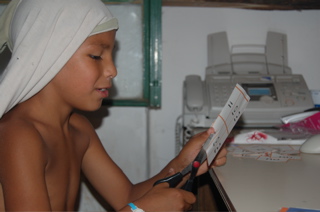
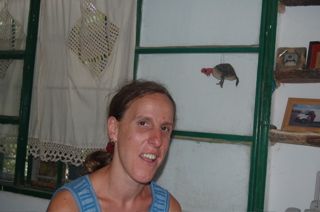


 Happy new year all. OK, I’m a few days late, but I do mean it sincerely. Christmas and New Year were spent eating cow with friends, and watching the fireworks at midnight. The photo on the left is of Giuliano aged 2 sharing his Christmas toys with Martin aged 47.
Happy new year all. OK, I’m a few days late, but I do mean it sincerely. Christmas and New Year were spent eating cow with friends, and watching the fireworks at midnight. The photo on the left is of Giuliano aged 2 sharing his Christmas toys with Martin aged 47.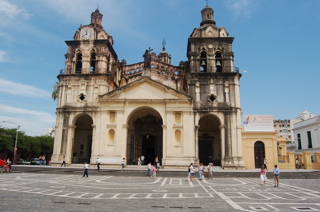
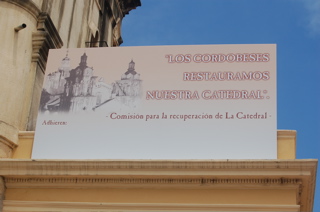 The noticeboard in this photo says “The Cordobans are restoring our own cathedral”. That makes me so happy. Not so much because the cathedral is undergoing a facelift (although it surely needs one), but because of the pride and conciousness behind the words. It makes me happy for the same reasons that I am an avid buyer of street newspapers; “The Big Issue” in the UK, and “La Luciernaga” in Cordoba. It is the difference between the learned helplessness of “I tell you my problem and I wait with my hands open”, and the empowerment in “I have owned my problem and now I am owning my solution”. We have been told that the roots of learned helplessness stem directly from the teaching and behaviour of the Catholic church, which I have no reason to doubt the historical accuracy of this, but today the phenomenon is far more widespread than just the Catholic church. And now we see the Catholic church modeling something completely different. I wonder if it will catch on?
The noticeboard in this photo says “The Cordobans are restoring our own cathedral”. That makes me so happy. Not so much because the cathedral is undergoing a facelift (although it surely needs one), but because of the pride and conciousness behind the words. It makes me happy for the same reasons that I am an avid buyer of street newspapers; “The Big Issue” in the UK, and “La Luciernaga” in Cordoba. It is the difference between the learned helplessness of “I tell you my problem and I wait with my hands open”, and the empowerment in “I have owned my problem and now I am owning my solution”. We have been told that the roots of learned helplessness stem directly from the teaching and behaviour of the Catholic church, which I have no reason to doubt the historical accuracy of this, but today the phenomenon is far more widespread than just the Catholic church. And now we see the Catholic church modeling something completely different. I wonder if it will catch on?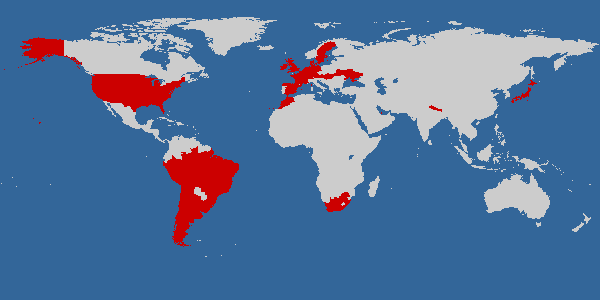
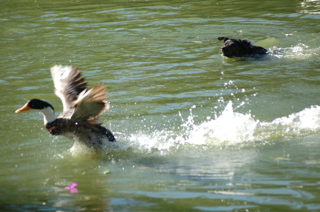
 The first time we took our dog to the park, she had never seen ducks before, or water deeper than the puddles in our road when it rains. These days her favourite activity is swimming after the ducks in the pond. She has a lot of stamina as well now. Luckily she never manages to catch any, because when she gets too close, they flap away, filling her face with water in the process. But she never tires of trying. I don’t take her every day, because I think the ducks don’t really enjoy the game as much as she does. Sometimes we go to the other end of the park, to give the pigeons their exercise…
The first time we took our dog to the park, she had never seen ducks before, or water deeper than the puddles in our road when it rains. These days her favourite activity is swimming after the ducks in the pond. She has a lot of stamina as well now. Luckily she never manages to catch any, because when she gets too close, they flap away, filling her face with water in the process. But she never tires of trying. I don’t take her every day, because I think the ducks don’t really enjoy the game as much as she does. Sometimes we go to the other end of the park, to give the pigeons their exercise… I was cleaning under the bed, (sometimes it happens), and a huge black thing flew out. “Eeeek it’s a bat” I said.
I was cleaning under the bed, (sometimes it happens), and a huge black thing flew out. “Eeeek it’s a bat” I said.